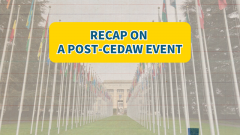Intersectional approach to hate speech against minorities in social media (FMI13, 2020, OS)
November 20, 2020
IMADR delivered the oral statement on “Intersectional approach to hate speech against minorities in social media” at the 13th session of the Forum on Minority Issues. Whole text can be read below or download here. ![]()
———
Oral Statement: 13th session of the Forum on Minority Issues
Item 5: Towards a safer space for minorities: positive initiatives to address online hate speech: the role of national human rights institutions, human rights organizations, civil society and other stakeholders
20 November 2020
Thank you Madam Chair,
IMADR congratulates the Special Rapporteur for the success in convening the second Asia-Pacific Regional Forum despite many challenges imposed by the COVID-19 pandemic. The Regional Forum allowed interactions among stakeholders including social media platforms and minorities to address the growing challenge against the protection of minority rights.
Given the absence of a regional human rights mechanism, it is crucial that the Special Rapporteur on minority issues and other relevant UN human rights mechanisms pay a close attention to the issue of hate speech against minorities and other racialised groups in the Asia Pacific region. To do so, it is imperative that Member States ensure that the UN human rights bodies and the Office of the High Commissioner for Human Rights (OHCHR) are provided with adequate resources to cooperate with civil society actors in the region.
We are encouraged by the Forums’ clear recognition of the role of civil society in promoting a safer social media environment for minorities. Human rights defenders, especially those belonging to minority groups, are often subject to threats, intimidation and harassment in both online and offline when they speak up against hate speech in social media. Those attacks can only exacerbate when they are also targeted for their intersecting identities such as gender, gender identity, sexual orientation, and disability.[1] Solidarity and collective efforts of different sections of civil society are necessary to effectively address hate speech in social media, since often same speakers promote discriminatory ideas against different marginalised groups[2]. In this context, we were encouraged by the reference to minority women in your opening speech. As it was rather limited in the recommendations from the regional forums, we suggest to the Special Rapporteur to ensure an intersectional approach to the issue of hate speech in recommendations to States, intergovernmental organisations, companies, national human rights institutions and civil society.
Thank you.
[1] A/70/217, paragraph 53
[2] A/73/305, paragraph 13




